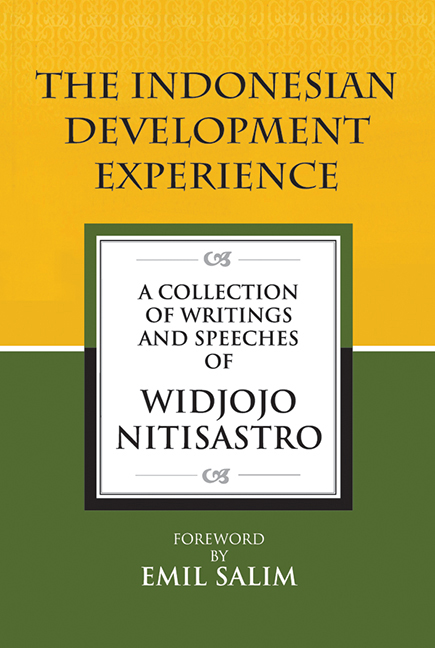Book contents
- Frontmatter
- Dedication
- Frontispiece
- Contents
- Foreword
- Introduction
- Part I PLANNING OF INDONESIA'S DEVELOPMENT
- Part II IMPLEMENTATION OF INDONESIA'S DEVELOPMENT
- 9 Progress and Challenges of Indonesia's Development (1990)
- 10 Some Features of Indonesia's Economic Development During the Last Twenty-Five Years (1993)
- 11 Oil and the Indonesian Economy (1985)
- 12 Making Tough and Painful Decisions (1991)
- 13 Responding to Various Development Proposals (1997)
- Part III FACING VARIOUS ECONOMIC CRISES
- Part IV SETTLEMENT OF FOREIGN DEBT
- Part V EQUITABLE DEVELOPMENT
- Part VI INDONESIA AND THE WORLD
- Index
- About the Author
12 - Making Tough and Painful Decisions (1991)
from Part II - IMPLEMENTATION OF INDONESIA'S DEVELOPMENT
Published online by Cambridge University Press: 21 October 2015
- Frontmatter
- Dedication
- Frontispiece
- Contents
- Foreword
- Introduction
- Part I PLANNING OF INDONESIA'S DEVELOPMENT
- Part II IMPLEMENTATION OF INDONESIA'S DEVELOPMENT
- 9 Progress and Challenges of Indonesia's Development (1990)
- 10 Some Features of Indonesia's Economic Development During the Last Twenty-Five Years (1993)
- 11 Oil and the Indonesian Economy (1985)
- 12 Making Tough and Painful Decisions (1991)
- 13 Responding to Various Development Proposals (1997)
- Part III FACING VARIOUS ECONOMIC CRISES
- Part IV SETTLEMENT OF FOREIGN DEBT
- Part V EQUITABLE DEVELOPMENT
- Part VI INDONESIA AND THE WORLD
- Index
- About the Author
Summary
Introductory Note: The disorder in the world economy has been going on for years, affecting virtually all countries. But it is mostly the developing countries that have borne the brunt of it. Hence, it is an absolute necessity for leaders of developing countries to be persistently vigilant and to avoid any doubt in making the necessary decisions, however difficult or painful they may be.
President Soeharto has never shown the slightest hesitation in making well-thought over decisions in leading the country, no matter how difficult and painful they would be. Two of his many decisions will be described below, the first was made in 1968 and the second in 1986. The first decision was related to the increase of fuel prices (BBM), while the second one was linked to the devaluation of the rupiah in September 1986, although he had said in January of that year that the rupiah would not be devaluated. Said he during the devaluation: “I consider it to be the upper ground morally, and that it is more responsible to tell it like it is to the people, while consciously making this painful decision for the sake of long-term development planning, than refraining from making the painful decision merely for the sake of saving my face because of the statement I had made earlier.”
Twenty-five years ago, the prosperity level of the Indonesian people was quite low; the economy was in a mess; the people were engaged in dissonant relations — verging on war — with neighbouring countries. Now, Indonesia, together with Singapore, Thailand, Malaysia, South Korea and Hong Kong, is among a small group of developing countries considered successful in their development. However, Indonesia still has a long way to go. There are many goals still to be reached. Many weaknesses are still to be rectified. There is no place for complacency.
Yet, it is clear that Indonesia has done well in its economic development. During the twenty-five years of development under the leadership of Pak Harto (President Soeharto), the living standard, the level of intelligence, and the welfare of the people have gradually increased. At the same time, a sound foundation has been laid down during every phase of development for the next stage of development.
There are many among us who did not experience the time when development had yet to kick-off in Indonesia twenty-five years ago.
- Type
- Chapter
- Information
- The Indonesian Development ExperienceA Collection of Writings and Speeches, pp. 139 - 150Publisher: ISEAS–Yusof Ishak InstitutePrint publication year: 2011



